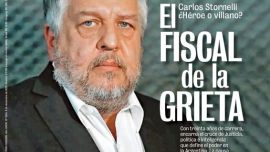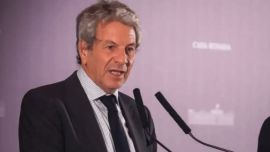Minister Sergio Massa held an behind-the-scenes meeting, of nearly an hour, with managing director of the International Monetary Fund, Kristalina Georgieva, where he made progress on the details of the remodelling of the foreign debt repayment agreement Argentina holds with the multilateral credit institution. The meeting is considered the prelude of a package of measures, some of which are to be announced on Friday.
According to PERFIL, exclusively off the record, Massa’s meeting with Georgieva was held in the “strictest confidence”. It just so happens that the intervention of the top referents in the negotiation took place in parallel with the talks being held in Washington by the committee which has been there since last Monday, headed by Deputy Minister Gabriel Rubinstein and Second Vice President of the Central Bank, Lisandro Cleri. While officials and the staff are polishing the technical details, the Argentine minister and the head of the IMF achieved a synthesis of the political will to close the deal.
The virtual conclave took place between 8.30 pm and 9.30 pm, Argentina time. Massa was accompanied by the head of advisors of the Ministry of Economy, Leonardo Madcur, and Secretary of the Treasury Raúl Rigo, who quickly went to Ezeiza to board the American Airlines flight scheduled to depart at 10.30 pm. Both officials’ involvement is essential, because they carry the details of the deal in the points that had yet to be agreed upon.
Agreement and measurements to sustain the economy
As anticipated by PERFIL, Madcur, Massa’s right-hand man in terms of political definition, and Rigo joined the trip as a sign of backing the negotiations, which had started off with uncertainties earlier this week. Today, “Economy claims it is all headed for a close, and on Friday measures could even be taken which are part of the deal package”, said reliable sources from the Treasury.
The outcome of the day, with the secret meeting with Georgieva, had two key background facts: Massa himself, between electoral rallies and measurements, managed to have telephone and virtual meetings with White House officials and the German economic team. Both countries are key for a close in favour of Argentina on the IMF board. Two other heavyweights are Japan, the second largest shareholder of the Fund, and China, which had already anticipated its backing. With these endorsements, the meeting with the head of the Fund took off faster.
The understanding with the United States and Germany had stemmed from two protocol meetings, where both countries opened the door. Last Tuesday morning, Massa spoke, via Zoom, with State Secretary for financial market policy at the German Federal Ministry of Finance, Jörg Kukies; and, towards noon, he talked to the internacional economic advisor of the US National Security Council, Mike Pyle. Then he got the backing to close the new deal with the IMF.
IMF claims: devaluation and end of currency control
The day had started in a complicated way for negotiations. Late on Tuesday, the IMF published a conclusive report on Argentina’s needs to straighten out its uncertain economy. It claimed devaluation there, to eliminate different exchange rates and the application of a tax and foreign exchange adjustment. “The possible political answers are tax consolidation which favours growth, combined with a restrictive monetary policy and a simplified foreign exchange system, all of which are still essential to moderate the growth of domestic demand, reinforce the balance of trade, reinstate international reserves, regain access to markets and guarantee the sustainability of fiscal and foreign debt”, as per the External Sector Report (ESR), called “External Rebalancing in Turbulent Times”.
However, those measures are outside the current discussion. The claim for measures which balance the macroeconomic context are part of the prescriptions the Fund wants to install on the agenda of reforms which the next government will have to put into practice from its arrival on 10 December this year. At least, Massa made it clear that there will not be inflationary devaluation, or an adjustment of expenses to be put into practice in the short or the medium term, with an election coming with him as a presidential hopeful for the ruling party.
According to PERFIL, Massa will go deeper into his active involvement in campaigning, without already being able to include any administrative action before the polls. Yet a remodelled agreement will come as positive news, both in the population, who feared negative effects on the economy given worsened financial conditions; and also in the markets, which had reacted with foreign exchange tensions, which increased the “blue” dollar to new records. Friday’s measures will seek to clear the uncertainties, as stated by sources from the economic team.



















Comments